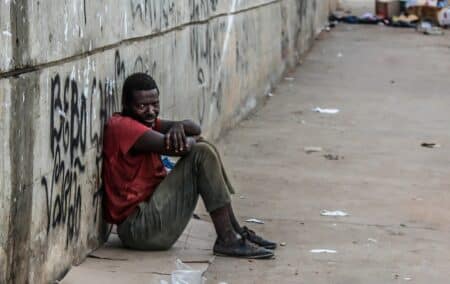Why does the ANC despise poor people? Why is it so determined to shut them out of the formal economy? President Ramaphosa’s recent speech on the government’s economic recovery plan included no measure for letting poor people get jobs working for other poor people. Why? The answer can be seen in the history of Africa after the European colonists handed over power to Africans.
The most striking feature of independent Africa is the contempt the African ruling classes show for the African masses. Class distinction is a fact of all human societies (and many animal societies, too) but nowhere is class distinction more acute than in black Africa.
Under colonialism there was a gap between the white rulers and the ordinary people; under independence this widened to a chasm between the ruling class and ordinary people. The incoming black rulers mimicked the superior ways of the white rulers, but much more so. Ian Smith as ruler of Rhodesia rode around in an old Peugeot; Robert Mugabe as ruler of Zimbabwe rode around in a fleet of Mercedes with motorbike outriders to drive the common people out of his way.
Not only were the black rulers highly acquisitive but also desperately keen for high-class status to separate themselves from the working classes. It is the same in South Africa under the African National Congress (ANC).
The black ruling classes send their own children to posh schools with white teachers but send black working-class children to poor schools with black teachers. The ruling classes live in suburbs and use private transport; the working classes live in townships and slums and use public transport. The black ruling classes control the formal economy and shut poor black people out of it, forcing them into the informal economy or unemployment. Throughout Africa there is huge unemployment and a huge informal sector. There is a massive public sector, where an army of bureaucrats owes its salaries to the government, and is accordingly subservient. The formal private sector is small, regarded with suspicion by the ruling party and highly regulated to stop poor people joining it.
Industry is shrinking
In South Africa, economic growth is low, unemployment is rising and industry is shrinking. We know how to remedy all of these problems. Country after country in the Far East have shown how. This is why Japan, China, Singapore and South Korea are much more advanced than African countries, and why Vietnam is going the same way. Free the economy. Remove the chains and fetters that bind it. Get rid of strangling regulation. Scrap BEE (a form of official bribery to the ruling classes). Remove our destructive labour laws. Remove the minimum wage. Release the energy of our people. Allow the poor to join the formal economy. Allow poor black people to become employers.
There is an unholy alliance between the ANC government, big business and the trade unions to shut poor people out of the economy. The National Economic Development and Labour Council (Nedlac) brings the three together to plot against the poor. Bargaining councils are given legal power to force impossible conditions on poor employers. Only the rich, only the upper classes, may run businesses; only they may employ people. Small businesses are aborted before they are born.
Part of the reason is greed. The trade unions do not want poor people to compete for jobs against their members; they insist on compulsory high wages, which brings in more fees for the union leaders. Big business is happy to crush small competitors. But much of the reason is class. The ANC, the trade union bosses and university academics (black and white) shudder at the thought of poor, low class people becoming an independent economic force without regard for their social superiors. They are quite happy for a poor black parent to receive a social grant of R740 a month but refuse to allow the same parent to receive an income of R3 400 a month from a private job (the minimum wage is R3 500). This is because the grant comes from the ruling class, and the recipient should be accordingly grateful, whereas the R3 400 would come from some upstart low-class employer. I read a white academic saying that anybody who couldn’t pay the minimum wage had no right to be an employer. Only the upper classes had that right.
Too expensive
South Africa cannot run industries requiring skilled labour because we don’t have the skills (the ANC education system has killed them). And we cannot run industries requiring unskilled labour because it is too expensive. The answer is to allow employers and employees to make their own employment contracts on terms acceptable to both, free from government interference. As little factories and businesses using cheap labour become successful, unemployment will fall, wages will rise and in-house skills will be taught – exactly as happened in China and is happening now in Vietnam.
The main obstacle to this liberation of our economy is resistance from the ANC and the ruling classes of the economy.
If you like what you have just read, support the Daily Friend

